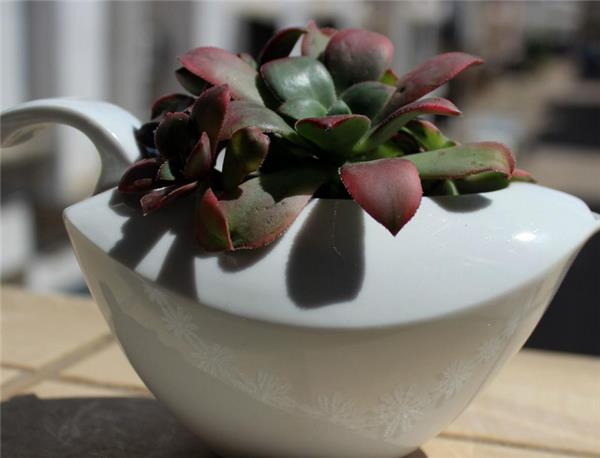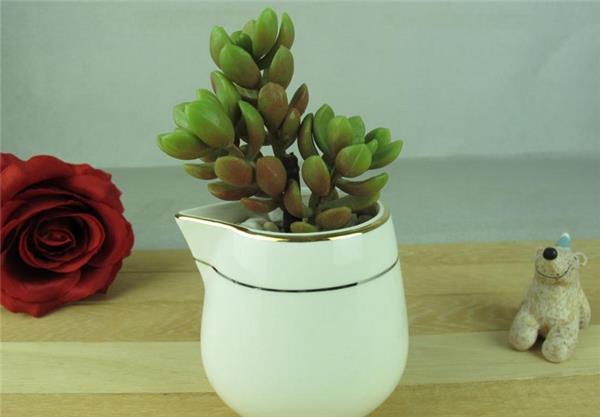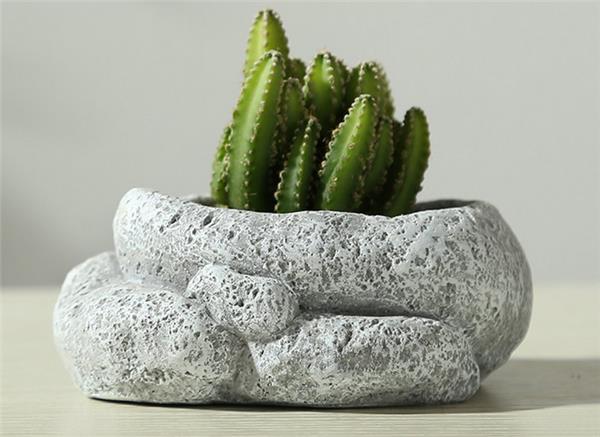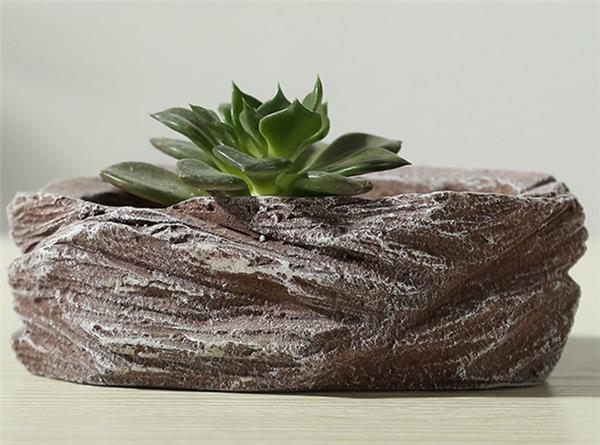Can succulent plants be watered?
Can succulent plants be raised in water? If possible, what do you need to pay attention to? Friends who want to know might as well take a look at the following introduction!

Can succulent plants be raised in water?
Succulent plants, like other plants, can also be hydroponically cultivated. As long as they find a suitable method, they can also grow very well. After several long months of hydroponic experiments, it is found that it is cleaner than the soil, and it takes root faster in the early stage, so it is not easy to give birth to insects. The initial hydroponic culture is much better than soil culture, which is very conducive to plant growth, and hydroponics is also a good choice for those succulent plants that are not in good hands. However, in the later stage, hydroponic culture is obviously inferior to soil culture because of lack of nutrition, whether it is size or group.
Hydroponic succulent plants are much cleaner than soil succulent plants, and they take root quickly in the early stage of hydroponic culture, so they are not easy to produce insects. However, it is easy to be undernourished in the later stage of hydroponic culture.
The requirement of hydroponic succulent plant container is not high, general utensils can be used as hydroponic container, but hydroponic succulent plant should pay attention to the following aspects:
1. Water level
The water level and the location of the root system are very critical, more water will lead to rotting root, less water will lead to root drying, and the whole plant will be short of water. The water level of succulent plants has a lot to do with their varieties.
For example, those with relatively developed roots such as 12 rolls and jade dew can add more water to the container to make the roots completely soak in water; crassulaceae stone lotus itself has very few roots, and does not need too much water, so the roots can just touch the water.
Of course, you can also set aside some space for the root system to stretch down and absorb water.
2. Pay attention to changing water
Hydroponic succulent plants should pay attention to changing water to avoid root rot caused by lack of oxygen in water. In addition, changing water can also remove some moss growing in the water, increase the permeability of water and benefit the photosynthesis of roots.

3. Fertilization
Hydroponic succulent plants are prone to undernutrition in the later stage, so appropriate fertilization can be carried out when hydroponic succulent plants are cultivated.
Fertilization can choose to drip 0.2% potassium permanganate solution according to the proportion of water capacity at 1:5, which can not only prevent the growth of moss in water, but also sterilize and prevent root rot, but also provide manganese and potassium nutrition to plants and promote plant growth.
Foliar fertilization can also be used. Fertilizers can be urea 0.1%, potassium dihydrogen phosphate 0.15%, calcium superphosphate 2%, sprinkled on the leaves when there is no wind on a sunny day. Keep in mind that this method should not be carried out on a sunny noon, otherwise it will cause foliar burns.
4. Root pruning
If the roots of hydroponic succulent plants grow too dense, the old roots should be deleted properly and the long roots should be trimmed to promote the germination of new roots and enhance the root activity. In addition, if the rotten root is found to be removed in time, and change the water in time.

Although the hydroponic cultivation of succulent plants is very simple, if succulent plants cultured in hydroponics for a long time want to maintain good growth, they must pay attention to some key points of conservation.
1. Keep the cultivation environment well ventilated
Fresh air can promote the metabolism of succulent plants, usually in the room personnel activities are more frequent, coupled with poor ventilation, it will significantly reduce the amount of dissolved oxygen in water, which is not conducive to the normal respiration of hydroponic succulent plants. Therefore, for rooms with hydroponic succulent plants, doors and windows should always be opened to keep the indoor air fresh, so as to increase the amount of dissolved oxygen in water in hydroponic utensils, which is conducive to the healthy growth of hydroponic plants.
two。 Extra-root topdressing is beneficial to the growth of hydroponic succulent plants.
Extra-root topdressing is a special fertilization method in which diluted chemical fertilizers or trace elements are sprayed on the leaves of plants and absorbed and utilized through stomata, also known as foliar fertilization.
The amount of extra-root fertilization is small, the fertilizer effect is fast, and is not affected by the absorption function of the root system. Generally, it can be absorbed 5 hours after spraying. The fertilizer effect can last about 10 days, so extra-root topdressing can be sprayed once every 10 days. However, not any fertilizer can be fertilized outside the root, usually only easily soluble fertilizers such as urea, potassium dihydrogen phosphate and calcium superphosphate are used as off-root fertilization. The appropriate solubility is: urea 0.1%, potassium dihydrogen phosphate 0.15%, calcium superphosphate 2%. Fertilization outside the root should be carried out when there is no wind on a sunny day, not at noon when the sun is shining, so as not to burn the leaves.
3. Pruning root system and other
The roots of succulent plants swaying in the water are characteristic of hydroponic ornamental plants and usually do not need to be pruned so as not to affect the ornamental quality. However, with the passage of time, when the root system grows too long and too dense, it is still necessary to delete the old root properly and trim the long root to promote the germination of new root and enhance the root activity. In addition, if the root rot is caused by too high water temperature or too concentrated nutrient solution, the rotten root should be cut off in time, and the water should be changed every I-2 until the new root of the plant germinates before it is transferred to normal maintenance.

4. Artificial oxygenation promotes growth.
The growth rate of succulent plants under hydroponic culture is usually slow, mainly due to the relative lack of oxygen needed by the plant roots, resulting in the slow transport of nutrients. In the process of water cultivation of succulent plants, the root system will continue to consume the dissolved oxygen in the nutrient solution, although in the natural environment, the oxygen in the air will slowly dissolve into the nutrient solution, but the quantity is rare, which is far from enough to meet the oxygen demand of the root system. In order to promote the normal growth of hydroponic succulent plants, in addition to changing water regularly, miniature aeration pumps can also be used to inflate the water (nutrient solution) in the hydroculture container, so that the roots can get sufficient oxygen.
5. Application of potassium permanganate
Hydroponic succulent plants are mostly suitable for growing in bright light, but when the water (nutrient solution) in transparent containers is exposed to sunlight or scattered by light, it is easy to grow moss, which not only affects the ornamental, but also consumes oxygen in the water. hinders the growth of the root system. In the vigorous growth season of spring and autumn, the moss attached to the root system and the inner wall of utensils can be washed off by changing water (nutrient solution). In summer and winter, because the water is contained in the hydroponic utensils, once moss appears, in addition to changing the water, 0.2% potassium permanganate solution can be added according to 1 inch of the water capacity of the containers (0.1 grams of potassium permanganate tablets are sold in drugstores. 0.5 L of water is 0.2% concentration), which can not only prevent the growth of moss in water, but also sterilize and prevent root rot. At the same time, it can also provide manganese and potassium nutrition to the plant and promote the plant growth. Like traditional soil cultivation, timely and appropriate fertilization is an indispensable maintenance work in order to make hydroponic succulent plants grow normally and healthily. Although the water also contains a small number of nutrients needed by plants, they often can not meet the needs when the plants are growing vigorously. In order to make succulent plants grow well in hydroponics, the necessary reasonable fertilization must not be ignored. So how to fertilize succulent plants? Next, I would like to introduce you.
The fertilization concentration of hydroponic succulent plants should be well grasped. In traditional soil cultivation, once more fertilizer is applied, it can be gradually lost from the drainage hole at the bottom of the flowerpot by watering over and over again. But hydroponic culture is different, because all the added nutrients are dissolved in water, once the concentration is too high, it will cause fertilizer damage to the plant, and in serious cases, it will lead to plant death.
The rotten roots should be cut off in time, and the water should be changed once every I-2, and it will not be transferred to normal maintenance until the new roots of the plant germinate.

4. Artificial oxygenation promotes growth.
The growth rate of succulent plants under hydroponic culture is usually slow, mainly due to the relative lack of oxygen needed by the plant roots, resulting in the slow transport of nutrients. In the process of water cultivation of succulent plants, the root system will continue to consume the dissolved oxygen in the nutrient solution, although in the natural environment, the oxygen in the air will slowly dissolve into the nutrient solution, but the quantity is rare, which is far from enough to meet the oxygen demand of the root system. In order to promote the normal growth of hydroponic succulent plants, in addition to changing water regularly, miniature aeration pumps can also be used to inflate the water (nutrient solution) in the hydroculture container, so that the roots can get sufficient oxygen.
5. Application of potassium permanganate
Hydroponic succulent plants are mostly suitable for growing in bright light, but when the water (nutrient solution) in transparent containers is exposed to sunlight or scattered by light, it is easy to grow moss, which not only affects the ornamental, but also consumes oxygen in the water. hinders the growth of the root system. In the vigorous growth season of spring and autumn, the moss attached to the root system and the inner wall of utensils can be washed off by changing water (nutrient solution). In summer and winter, because the water is contained in the hydroponic utensils, once moss appears, in addition to changing the water, 0.2% potassium permanganate solution can be added according to 1 inch of the water capacity of the containers (0.1 grams of potassium permanganate tablets are sold in drugstores. 0.5 L of water is 0.2% concentration), which can not only prevent the growth of moss in water, but also sterilize and prevent root rot. At the same time, it can also provide manganese and potassium nutrition to the plant and promote the plant growth. Like traditional soil cultivation, timely and appropriate fertilization is an indispensable maintenance work in order to make hydroponic succulent plants grow normally and healthily. Although the water also contains a small number of nutrients needed by plants, they often can not meet the needs when the plants are growing vigorously. In order to make succulent plants grow well in hydroponics, the necessary reasonable fertilization must not be ignored. So how to fertilize succulent plants? Next, I would like to introduce you.
The fertilization concentration of hydroponic succulent plants should be well grasped. In traditional soil cultivation, once more fertilizer is applied, it can be gradually lost from the drainage hole at the bottom of the flowerpot by watering over and over again. But hydroponic culture is different, because all the added nutrients are dissolved in water, once the concentration is too high, it will cause fertilizer damage to the plant, and in serious cases, it will lead to plant death.
Related
- Wuhan Hospital Iron Tree Blooming Result Was Instantly Frightened by the Gardener Master
- Which variety of camellia is the most fragrant and best? Which one do you like best?
- What is the small blue coat, the breeding methods and matters needing attention of the succulent plant
- Dormancy time and maintenance management of succulent plants during dormancy
- Minas succulent how to raise, Minas succulent plant pictures
- What are the varieties of winter succulent plants
- How to raise succulent plants in twelve rolls? let's take a look at some experience of breeding twelve rolls.
- Attention should be paid to water control for succulent plants during dormant period (winter and summer)
- Watering experience of twelve rolls of succulent plants
- Techniques for fertilizing succulent plants. An article will let you know how to fertilize succulent plants.



